Yesterday I shared a bit about why I found the new book by Bill McKibben to be so very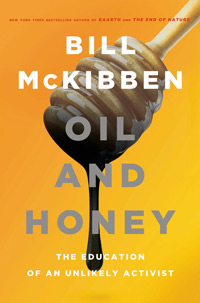 moving and important. Oil and Honey: The Education of an Unlikely Activist spoke to me because I’ve done some of the organizing and civil disobedience actions he described and his effort to stay normal – in a manner of speaking – and joyful in his own family and place remains one of the largest challenges for many of us who attempt to make a difference in the world. Although much of the book is about McKibben’s dramatic efforts starting up 350.org and helping to organize the civil disobedience campaigns at the White House to protest the Keystone Pipeline project and its connection to the very dirty Tar Sands oils in Canada, some of it is about Kirk Webster, beekeeper extraordinaire and his efforts to keep a modest beekeeping and chemical-free honey business in Vermont. Yep, it’s a book about protests and beekeeping. Oil and honey, get it? It’s not every day a book-seller gets to say that.
moving and important. Oil and Honey: The Education of an Unlikely Activist spoke to me because I’ve done some of the organizing and civil disobedience actions he described and his effort to stay normal – in a manner of speaking – and joyful in his own family and place remains one of the largest challenges for many of us who attempt to make a difference in the world. Although much of the book is about McKibben’s dramatic efforts starting up 350.org and helping to organize the civil disobedience campaigns at the White House to protest the Keystone Pipeline project and its connection to the very dirty Tar Sands oils in Canada, some of it is about Kirk Webster, beekeeper extraordinaire and his efforts to keep a modest beekeeping and chemical-free honey business in Vermont. Yep, it’s a book about protests and beekeeping. Oil and honey, get it? It’s not every day a book-seller gets to say that.
I promised a list of other suggestions, a handful of useful books that will help inspire us to live local, to be present within our own economies of scale, aware of what some might call a watershed or bioregion. These 9 that I chose for your consideration aren’t technical or heavy, but wonderful calls to a way of life that is sustainable, stewardly, sensible and good. If you want more overtly theological works on the Biblical mandate to care for creation and a Christian philosophy of earth-keeping and such, see this BookNotes column from a few years ago. I put my heart into that one, too.
S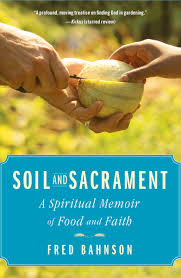 oil and Sacrament: A Spiritual Memoir of Food and Faith Fred Bahnson (Simon & Schuster) $26.00 We’ve mentioned this before and I lauded it without spending too much time immersed in its amazing, captivating stories. Bahnson starts the book admitting his obsession and frustrations with a community garden he oversaw for a North Caroline United Methodist church. He’s a farmer, all right, and very clearly called to steward the land and produce food, local good food for folks, especially the poor and those without easy access to home-grown stuff. As Rhoda Janzen wrote, “Bahnson had me at the hairy vetch and crimson clover. He bumped me off the couch and into the garden even before I could finish the book.” (That Bill McKibben himself says it “is profoundly, beautifully down to earth, which is almost certainly where we all need to spend more time on a planet in crisis” is pretty great, too.) Bahnson leaves the Anathoth Community Garden and ends up going on a bunch of visits to other such faith-based gardening and farming projects where he does the whole “embedded journalism” thing. He gets to know the monks or Methodists or Pentecostals who run the farms, he prays with them, hears their stories, helps them do the dirt.
oil and Sacrament: A Spiritual Memoir of Food and Faith Fred Bahnson (Simon & Schuster) $26.00 We’ve mentioned this before and I lauded it without spending too much time immersed in its amazing, captivating stories. Bahnson starts the book admitting his obsession and frustrations with a community garden he oversaw for a North Caroline United Methodist church. He’s a farmer, all right, and very clearly called to steward the land and produce food, local good food for folks, especially the poor and those without easy access to home-grown stuff. As Rhoda Janzen wrote, “Bahnson had me at the hairy vetch and crimson clover. He bumped me off the couch and into the garden even before I could finish the book.” (That Bill McKibben himself says it “is profoundly, beautifully down to earth, which is almost certainly where we all need to spend more time on a planet in crisis” is pretty great, too.) Bahnson leaves the Anathoth Community Garden and ends up going on a bunch of visits to other such faith-based gardening and farming projects where he does the whole “embedded journalism” thing. He gets to know the monks or Methodists or Pentecostals who run the farms, he prays with them, hears their stories, helps them do the dirt.
Every one of these thrilling chapters are great, from his learning about the liturgy of the hours and growing mushrooms at a monastery in NC to hanging out at Adamah Farm (a Jewish agricultural community) in NY to the time he spent with one of my heroes, Bob Ekblad at Tierra Neuva in Burlington, WA. Ekblad, by the way, is an amazing guy who has lived for years among peasants in Central America working on new ways to farm that prevents soil erosions, and organizing against the big landholders there, finding himself up against injustices of the grossest sort. Part liberation theologian, part evangelical missionary with a heart for the poor, he learned much there, and risked his life for the social transformation projects in which he was involved. But he eventually grew disillusioned, realizing that to change farming there needs to be a change in the farmers, a spiritual change, and he ends up – it is a great story – having an extraordinary encounter with the Holy Spirit among Pentecostals.
Tierra Nueva now works forming community among the disadvantaged, the poor and imprisoned and marginalized, operates a respected fair trade coffee roasting business (run by a form meth dealer, now a colorful and street-wise follower of Jesus) helping broken people find inner healing, prayerful lives, and groundedness literally in the land of their region through their small farming plots. Bahnson’s chapter of being with these folks, being prayed for there and his time with this motley multi-ethnic crew of socia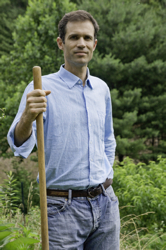 l justice-minded, Pentecostal farmers is nothing short of astonishing.
l justice-minded, Pentecostal farmers is nothing short of astonishing.
The whole book is pretty astonishing, really. Who knew about these wonderful projects? I already want a sequel following up the stories of each, or maybe finding other such intentional communities. You will love reading Soil and Sacrament — there is heartache here, some extraordinary miracles (yes, I cried tears of joy when I heard the good news about Bahnson’s friend Pharaoh) and the lovely, wise insights that come from watching over the shoulder of a person on a profound spiritual quest. It is interesting that even Parker Palmer writes about his experience reading it, how it encouraged him, that he now “sees new ways to put my beliefs into action.” By the way, Palmer says, notably, to “shelve this next to Wendell Berry, Annie Dillard, and Kathleen Norris” (yes!) and declares that this beautifully written memoir is “about new life – for ourselves, our descendants, and the earth on which we all depend” Yes, it is. But it also about one man’s spiritual journey, his own process of discerning his own vocation and how that effects his soul, his soil, and his family. Very, very, highly recommended.
M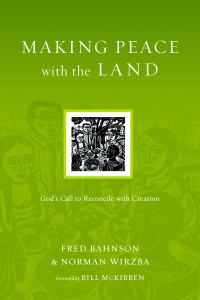 aking Peace with the Land: God’s Call to Reconcile with Creation Fred Bahnson & Norman Wirzba (IVP) $16.00 We have talked before about the wonderful series published by IVP in cooperation with the Duke Center for Reconciliation. They’ve done books about reconciliation among enemies, in gangs, during mission trips, between races. Each fabulous book is co-written by a scholar and practitioner, although in this case, I’m not sure which is which. Wirzba is a professor, mostly, I guess, and Bahnson really is a farmer, but both have dirt under their fingernails and both have published important and solid books. This series reminds us that God is reconciling all things in heaven and earth and in this one, it gets as down to Earth as possible.
aking Peace with the Land: God’s Call to Reconcile with Creation Fred Bahnson & Norman Wirzba (IVP) $16.00 We have talked before about the wonderful series published by IVP in cooperation with the Duke Center for Reconciliation. They’ve done books about reconciliation among enemies, in gangs, during mission trips, between races. Each fabulous book is co-written by a scholar and practitioner, although in this case, I’m not sure which is which. Wirzba is a professor, mostly, I guess, and Bahnson really is a farmer, but both have dirt under their fingernails and both have published important and solid books. This series reminds us that God is reconciling all things in heaven and earth and in this one, it gets as down to Earth as possible.
What wonderful, beautiful, Biblical theology this is. Walter Brueggemann (whose book The Land was very important to me in the late 70s and remains a must-read for anyone interested in Biblical theology) says that it is “a compelling summons to food repentance,., Their accessible, accessible, anecdotal style adds force to the critical bite of their invitation toward life-giving, life-sustaining food.” The always eloquent Barbara Brown Taylor “I cannot think of another book on making peace with the earth that does so much in so few pages – grounding its case with theological care…telling stories that make the book difficult to put down.” With chapters like “Food, Table, Communion” and “Reconciliation Through Eating” and “Bread for the Whole Body of Christ” this is not your typical book on creation care – this is a book on farming and food, on eating and fellowship, on joy and justice.
I so wish we could sell more of this handsome little paperback — it is very, very thoughtful. There’s a great study guide in the back, so you could use it for an adult study, a book club, or a Sunday school class. You could eat together, too!
By the way, if you want a big list I did at BookNotes a few years ago of books about food, feasting and a theology of eating, click here. Of course, Bahnson and Wirzba are included there.
B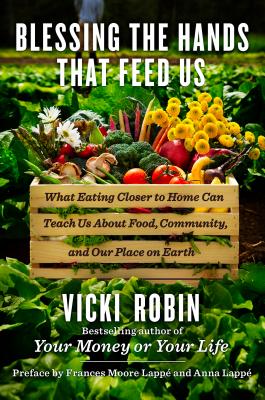 lessing the Hands That Feed Us: What Eating Closer to Home Can Teach Us About Food, Community, and Our Place on Earth Vicki Robin (Viking) $26.95 I know I gush about a lot of books here (why bother telling you about dumb ones?) but this one deserves a five star rating, too. I was utterly struck by the wonderful preface by Frances Moore Lappe and Anna Lappe, whose books have lead the way in sustainable agriculture, re-thinking food systems and the causes of hunger for over 30 years. They rave about this, and justly so. For instance, in the first paragraph of their preface, they write
lessing the Hands That Feed Us: What Eating Closer to Home Can Teach Us About Food, Community, and Our Place on Earth Vicki Robin (Viking) $26.95 I know I gush about a lot of books here (why bother telling you about dumb ones?) but this one deserves a five star rating, too. I was utterly struck by the wonderful preface by Frances Moore Lappe and Anna Lappe, whose books have lead the way in sustainable agriculture, re-thinking food systems and the causes of hunger for over 30 years. They rave about this, and justly so. For instance, in the first paragraph of their preface, they write
“Vicki Robin takes the world personally and, because of that, passionately engages in questioning assumptions and searching for new ways of seeing the world that suggest new ways of being. And in this way, we see ourselves in her. Being this way in the world isn’t always comfortable. It means finding yourself at cross purposes with the powers that be or at odds with the received wisdom, but Vicki’s writing, and this beautiful new book, allows us to experience the joy of a lifelong practice of asking questions.”
After some very good pages well worth pondering they again celebrate the book, saying “in this important work, Vicki expresses this uplifting understanding of what it means to be human and our sense that food is a powerful avenue for engagement in a healthier and happier future.” Later, she calls this movement one of “eyes wide open hope.”
Whether expressed in Hindu farmers in India saving seeds, Muslim farmers in Niger turning back the desert, or Christian farmers in the United States practicing biblically-inspired Creation Care, the revolutionary power of food is its capacity to upend a life-destroying belief system that’s brought us power-concentrating corporatism.
Dear readers and BookNotes friends: whether you lean conservative or liberal in your social and political life, this vision of “relational eating” that offers new understandings of the market and civic structures is bound to be helpful. It will give you courage to question and courage to live into certain sorts of newness of life. And that is a good thing, eh?
Ms Robin – whose book Your Money or Your Life became a best seller, invited people to rethink their debt and consumerism and find a spiritually rich and meaningful life by living on less – is a good writer, and she certainly understands the downsides of the globalized economy (she has learned well from the likes of the Lappes.) Her experiment here is truly interesting and informative; it is not only a fine read, but a very incisive critique of unhelpful ways we do agriculture, food, farming and eating these days.
Vicki Robin is not a farmer, and this isn’t a book about growing one’s own food, although she has a nice garden. Rather, it is about buying local, eating regionally, and (as the subtitle puts it) eating closer to home. Such eating adventures have been done before, and written about before, but this was a social experiment of eating nothing but food that could be grown or caught within a 10 mile radius – mostly from a neighbor’s half-acre farm on Whidbey Island, in the Puget Sound. Could a person survive without access to that cornucopia called the grocery store, she asks? These kinds of books are fun to read and inspiring (even though you know you are not called to duplicate their exact experiment.) I loved and reviewed Plenty by Alisa Smith and J. B. Mackinnon which was a year on a 100-mile diet, and often recommended the wonderfulYear of Plenty by Craig Goodwin, the fun Presbyterian pastor’s study of a similar year of living sustainably in the suburbs.) But this is a truly major contribution by one of the significant thought leaders of age, who has dreamed and imagined and dared to take bold steps to a more healthy, whole, and responsible life. After her fame from the book on money she got cancer and took some time away from the public. As she says in the beginning of Blessing the Hands, this experiment had a large impact on her recovery. She writes, “In 2010 I undertook an experiment that turned out to be one of the greatest adventures of my life. It was so small at the start, but it eventually grew – and blew me wide open.”
Ms Robin hoped this “sustainability as an extreme sport” effort would help bring her closer to a life of integrity. (Perhaps she should take up bees, like the guy in the McKibben book. Ha.) She is certainly right that “transforming our relationship with food and the hands that feed us transforms so much else.” “I invite you,” she continues, “to sit down at this banquet of stories and new ideas and nibble and graze and chew and digest and see how it all goes down. I invite you to simply enjoy yourself. If you find things you want to try, do so in a spirit of curiosity and good cheer. At the end of each chapter, a section called “Now It’s Your Turn” offers some action steps that, once you’ve read the whole book, you can come back to and try out.

Between the chapters, by the way, there are some wonderful recipes using regional ingredients (developed by some creative chefs on the island, I gather.) She promises that “there is something for everyone to savor – the gourmet, the activist, the lover of good tales. Bon appetite!” Who wouldn’t enjoy a book like that?
If you want to localize your life, eat better, and get to know those who grow local food, no matter where you live, this book is actionable, practical, and loaded (and I mean loaded) with ideas, project, proposals, plans and possibilities. Mr. McKibben says “Vickie Robin has helped millions of Americans reshape their lives in sound and beautiful ways, but this may be her most important project yet – and crucial for our tired planet, too.” The distinguished professor of Environmental Studies at Oberlin, David Orr says “Vicki Robin is a national treasure.”
Listen to this helpful quote by Michael Shuman, who wrote the important Local Dollars, Local Sense: How to Move Your Money from Wall Street to Main Street and Achieve Real Prosperity
Vicki Robin is modeling a self-reliant lifestyle that can end the violence of our industrial food system exacts against our health, our communities, our ecosystems. It serves as a compelling manifesto of localization. An engaging delightfully enjoyable read.”
C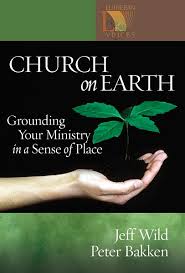 hurch on Earth: Grounding Your Ministry in a Sense of Place Jeff Wild & Peter Bakken (Augsburg) $10.99 Wanted to name this little book as it is ideal for a small study group, congregational leaders, or anyone wanting a quick reminder and helpful guide to bringing a sense of place and a green spirituality to their local congregation. I have liked many in this large series of small books published by the ELCA and although there is a bit Lutheran lingo, almost all of them are appropriate for any readers. Certainly this one is good for anyone, and it is so concise and yet helpful, we wanted to make sure you knew of it. May I recommend it, not because it is a major contribution or a massive new tome, but because it is excellent in what it intends – namely, to help think about ministry in a localized way, to take some of the “sense of place” conversation and apply it to congregational identity, and ways to help green Biblical eco-theology can inform the details of how churches do stuff in their own particularities. In this regard, it is a wonderful resource and very highly recommended.
hurch on Earth: Grounding Your Ministry in a Sense of Place Jeff Wild & Peter Bakken (Augsburg) $10.99 Wanted to name this little book as it is ideal for a small study group, congregational leaders, or anyone wanting a quick reminder and helpful guide to bringing a sense of place and a green spirituality to their local congregation. I have liked many in this large series of small books published by the ELCA and although there is a bit Lutheran lingo, almost all of them are appropriate for any readers. Certainly this one is good for anyone, and it is so concise and yet helpful, we wanted to make sure you knew of it. May I recommend it, not because it is a major contribution or a massive new tome, but because it is excellent in what it intends – namely, to help think about ministry in a localized way, to take some of the “sense of place” conversation and apply it to congregational identity, and ways to help green Biblical eco-theology can inform the details of how churches do stuff in their own particularities. In this regard, it is a wonderful resource and very highly recommended.
H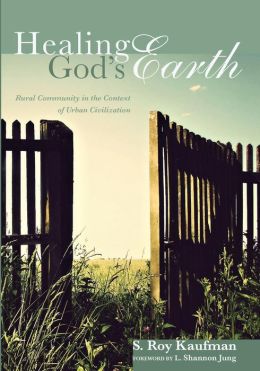 ealing God’s Earth: Rural Community in the Context of Urban Civilization S. Roy Kaufman (Wipf & Stock) $31.00 There simply are not many books on this topic, and this is nearly a tour de force. A slightly over-sized paperback, this is a thorough, generative, and very significant study written by an experience Mennonite pastor who has served churches in Iowa, Illinois, Saskatchewan and South Dakota. (The short foreword is by L. Shannon Jung who has written widely about food and land issues, and contextualized rural theology.)
ealing God’s Earth: Rural Community in the Context of Urban Civilization S. Roy Kaufman (Wipf & Stock) $31.00 There simply are not many books on this topic, and this is nearly a tour de force. A slightly over-sized paperback, this is a thorough, generative, and very significant study written by an experience Mennonite pastor who has served churches in Iowa, Illinois, Saskatchewan and South Dakota. (The short foreword is by L. Shannon Jung who has written widely about food and land issues, and contextualized rural theology.)
I am not positive about the statistics, but I believe it is true that most congregations in America are still rather small, and most are not in big cities. Yes, there is a trend towards mega-churches in mega-cities, big churches in suburbs, hip churches in groovy places. I wonder how this particular trend and a bias in the literature (both academic and popular) discourages and hinders those who want to be missional and responsible in their own small towns and rural regions? Pastor Kaufman suggests that the forces of urban structures have helped dismantle rural communities, and this is no neutral progress. Although this is mostly a sustained Biblical study, questions of rural job loss, environmental issues, the farms crises and questions of what community can look like in the country hover over and around the book. Healing God’s Earth offers more viable Biblical-theological thinking contextualized for rural life and ministry than any book I know. We have a few others — older classics like the collection Rural Ministry edited by L. Shannon Jung — that address the sociological issues facing rural communities with eroding infrastructure, aging populations, etc. etc. But this recent work is helpful because it reads the Bible through the lenses of the rural church. If you happen to know of any rural church leaders who might need this, do let them know. We are very glad to stock it and hope the word gets out about it.
L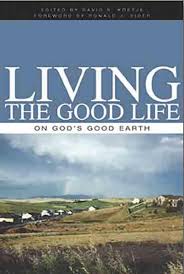 iving the Good Life On God’s Good Earth edited by David Koetje (Faith Alive) $11.50 We love showing this slim volume as it is an ideal primer on what it means to take up a Christian lifestyle rooted in stewardship, justice, and sustainability in the very way we live, the energy we use, the plants we grow and so forth. Published by the Christian Reformed Church, this collection of 10 short pieces is theologically well ground in a redemptive worldview and yet offers very detailed ideas to ponder, each with good discussion questions. Authors include Steve Bouma-Prediger, Janel Curry, Kenneth Piers and many other profs (many in departments such as geography, biology, consumer sciences, environmental studies and the like, and most from Calvin College, although teachers at Baylor and Hope and Kings and Gustavus Adolphus College are also represented.) A great foreword by Ronald Sider facetiously asks, “What were they thinking? Why would a team of Christian scholars collaborate on a book that dares to give practical advice on what we should eat, what clothes we should wear, and even what kind of house we should live in.” He clarifies, though, reminding us that “the gospel that we are to bring to the world embraces all of life. It not only calls sinners to receive Jesus as the Savior, it also calls them to acknowledge him as Lord of all creation… this book shows the fruit of deep and careful reflection on what Jesus’ call to discipleship really means for the way we live our everyday lives on God’s good earth.”
iving the Good Life On God’s Good Earth edited by David Koetje (Faith Alive) $11.50 We love showing this slim volume as it is an ideal primer on what it means to take up a Christian lifestyle rooted in stewardship, justice, and sustainability in the very way we live, the energy we use, the plants we grow and so forth. Published by the Christian Reformed Church, this collection of 10 short pieces is theologically well ground in a redemptive worldview and yet offers very detailed ideas to ponder, each with good discussion questions. Authors include Steve Bouma-Prediger, Janel Curry, Kenneth Piers and many other profs (many in departments such as geography, biology, consumer sciences, environmental studies and the like, and most from Calvin College, although teachers at Baylor and Hope and Kings and Gustavus Adolphus College are also represented.) A great foreword by Ronald Sider facetiously asks, “What were they thinking? Why would a team of Christian scholars collaborate on a book that dares to give practical advice on what we should eat, what clothes we should wear, and even what kind of house we should live in.” He clarifies, though, reminding us that “the gospel that we are to bring to the world embraces all of life. It not only calls sinners to receive Jesus as the Savior, it also calls them to acknowledge him as Lord of all creation… this book shows the fruit of deep and careful reflection on what Jesus’ call to discipleship really means for the way we live our everyday lives on God’s good earth.”
W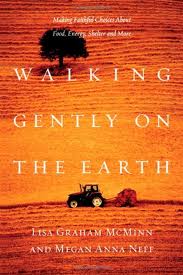 alking Gently On the Earth: Making Faithful Choices About Food, Energy, Shelter and More Lisa Graham McMinn & Megan Anna Neff (IVP) $16.00 Oh my, I was excited when I first promoted this a few years ago. What a practical, important topic, and there isn’t much published that is orthodox and yet richly theological but that gets so very practical. This is perfect for anyone wanting to go deeper than the above mentioned studied allows. Space does not allow me to review it thoroughly here, now, but you should know how much we love this book. McMinn, by the way, is a beautifully and gifted writer (she has written a book on sexuality that is wonderful, and another wise and lovely one called The Contented Soul.)
alking Gently On the Earth: Making Faithful Choices About Food, Energy, Shelter and More Lisa Graham McMinn & Megan Anna Neff (IVP) $16.00 Oh my, I was excited when I first promoted this a few years ago. What a practical, important topic, and there isn’t much published that is orthodox and yet richly theological but that gets so very practical. This is perfect for anyone wanting to go deeper than the above mentioned studied allows. Space does not allow me to review it thoroughly here, now, but you should know how much we love this book. McMinn, by the way, is a beautifully and gifted writer (she has written a book on sexuality that is wonderful, and another wise and lovely one called The Contented Soul.)
Neff has an MDiv from Princeton and at the time they wrote this she was living in Malawi and Ghana. Here’s a brilliant aspect of this good work: it is written by a suburban, middle-class theologian and professor (McMinn teaches sociology at George Fox University in Oregon) and her conversation partner, who brings a third world perspective. Here is how the back cover puts it, “Neff begins each chapter with a prelude that highlights her experience living in Africa, helping us glean the wisdom of another culture and reminding us of the interconnectedness of everything on the earth.” This really will give you and your group or family much to ponder, and will be an happy invitation to bring (as Sider said above) the Lordship of Christ to bear on all aspects of life. From our connection to bad farming practices and slave labor to finding alternative energy sources and using our consumer power, this really does give us new windows to the world, new ideas to engage, and faithful reminders of how to live wisely and joyfully in ways that honor God and love our neighbors well.
S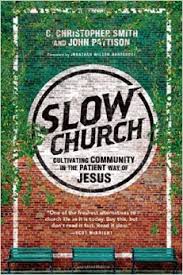 low Church: Cultivating in the Patient Way of Jesus C. Christopher Smith & John Pattison (IVP/Praxis) $16.00 Not Yet Released – due June 2014 I rarely review books before they arrive — I’m a bit of a slow-poke myself, you know. I have only read one chapter of this from a little pre-release pamphlet, but I have heard about the conversations happening around this as it has been stewing for a while. Not unlike the metaphor of “slow food” that has so inspired them, this invites us to patience, careful attention to detail, and a resistance to all things commercialized, fast-paced, glamorous, mass-produced, commodified, fragmented, abstract or disembodied. Or speedy. They hate that.
low Church: Cultivating in the Patient Way of Jesus C. Christopher Smith & John Pattison (IVP/Praxis) $16.00 Not Yet Released – due June 2014 I rarely review books before they arrive — I’m a bit of a slow-poke myself, you know. I have only read one chapter of this from a little pre-release pamphlet, but I have heard about the conversations happening around this as it has been stewing for a while. Not unlike the metaphor of “slow food” that has so inspired them, this invites us to patience, careful attention to detail, and a resistance to all things commercialized, fast-paced, glamorous, mass-produced, commodified, fragmented, abstract or disembodied. Or speedy. They hate that.
They wonder wisely if church has become modeled after fast food — fast church, perhaps? Franchise faith? To be Biblically faithful, spiritually significant and a bit counter-cultural to the zeitgeist in these days will require of us new habits, a sense of place, a resistance to “one-size fits all” models and a risky willingness to be authentic, small, even. We must believe that God wants us to be His people; church is very, very important; central to the coming of the Kingdom. But we don’t “build” that quickly. In trust, we can slow down and listen well to be a more intentional community — a slow church. This is a book unlike any you have read. As Scot McKnight says of it, “One of the freshest alternatives to church life as it is today,. Buy this, but don’t read it fast. Read it slow.”
I know these authors. Smith is involved in the Englewood Christian Church community in Indianapolis and editor of the truly wonderful Englewood Review of Books) and Pattison is the managing editor of Conspire magazine (founded by Shane Claiborne and his Simple Way gang) and was formerly an editor of the Burnside Writers Collective. John co-edited the collection of book reviews of 100 recommended books Besides the Bible in which yours truly has a humble little chapter. (And he’s the only guy I know who is also a member of the National Book Critics Circle.) I assure you of my trust in them and their decent lives to bear witness to their integrity, their sensible, modest visions, and how very, very sure I am that a mention of their book is essential in this particular list. They rather cleverly offer their vision of a slow church as a long friendly meal in three courses (with several chapters under each) — ethics, ecology, and economy. Dinner table conversation is one of their best metaphors as a way of being church. You can pre-order this book from us here at the discounted price. We will be re-announcing it as soon as we can — but we ain’t gonna rush — as soon as it is really available for sale, perhaps the end of May.
T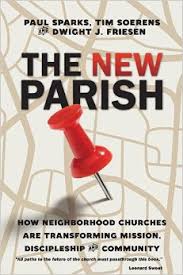 he New Parish: How Neighborhood Churches Are Transforming Mission, Discipleship and Community Paul Sparks, Tim Soerens & Dwight Friesen (IVP/Praxis) $17.00 I want to say this clearly: this is an important book and this brief review does not begin to do it justice; perhaps I will discuss it again, soon. It certainly deserves sustained attention. Len Sweet, for instance, says “All paths to the future of the church must pass through this book.” Brian McLaren says that it is “one of the most important books on the church, Christian identity and mission that I’ve read in a decade.” Phyllis Tickle says “Hands down, one of the most sensible and simultaneously exhilarating books I’ve read in a very long time.” Even Brueggy has weighed in, saying it is “teeming with fresh ideas and rich energy for the future of the church…” I respect and trust the authors, and it is, I am sure, one of the more important books on the missional church conversation we’ve seen this year.
he New Parish: How Neighborhood Churches Are Transforming Mission, Discipleship and Community Paul Sparks, Tim Soerens & Dwight Friesen (IVP/Praxis) $17.00 I want to say this clearly: this is an important book and this brief review does not begin to do it justice; perhaps I will discuss it again, soon. It certainly deserves sustained attention. Len Sweet, for instance, says “All paths to the future of the church must pass through this book.” Brian McLaren says that it is “one of the most important books on the church, Christian identity and mission that I’ve read in a decade.” Phyllis Tickle says “Hands down, one of the most sensible and simultaneously exhilarating books I’ve read in a very long time.” Even Brueggy has weighed in, saying it is “teeming with fresh ideas and rich energy for the future of the church…” I respect and trust the authors, and it is, I am sure, one of the more important books on the missional church conversation we’ve seen this year.
Those of you who distrust some of the hipster voices with the cool conferences that are just so, so edgy in the missional micro-brew milieus, don’t roll you eyes at these guys even if they are cooler than most of us. You should pay attention to their good work and this good book.
Happily, although these authors are very smart, their new book is not heady or abstract; indeed, it is a bit messy, as Dan Allender notes:
Sparks, Soerens and Friesen are potters whose artistry has required them to immerse themselves in all that is broken, dirty, and beautiful about the church and envision a new parish life that offers us all a taste of the banquet of reconciling love.
If you are used to the language of “parish” (as most in the mainline are, even if we don’t quite experience our churches or neighborhoods this way) this is more than what you might expect. It is not merely about reaching out to the neighbors near our church building or caring more about our local “sidewalks of the Kingdom” (as new urbanist Eric Jacobsen says in his great book by that name.) The New Parish really is a proposal, almost a manifesto, at once practical and yet visionary, allusive and generative — not a new big plan or even a model. It is a new social imaginary, a better and deeper way to think about what church is and what the missional vision of the people of God might be. And it encourages local, collaboration in ways that are fresh and important.
At the very least, it will get you out and about in your neighborhood, curious about and inspired to pay attention to what’s going on there. It has some exercises to help you do that, and as the weather warms a bit, it will be great to try to do what they suggest in this little experiment.
It does bring the “sense of place” perspective into the missional conversation, and asks us to re-vision not only what we mean by the local church, and what we mean by the local Kingdom mission, but how that might work out in more authentic relationships as churches overlap, cooperate, and view themselves as bearing witness to common concerns – the work of God in the world – in their common places. Few books about local church life so wisely draw on the work done on community by sociologists like John McKnight and Peter Block (kudos for that!) Few point us to “the theology of the built environment” (Timothy Gorringe) or “where mortals dwell” (Craig Bartholomew) or explore practices of “locavesting” (Amy Cortese.) Like I said, these guys are smart. And they are serious about re-popularizing the language of parishes.
How this good stuff about collaboration and presence (they cite Heifetz on adaptive leadership, if that gives you a clue of their depth and seriousness) and emerging networks actually works out within mainline denominational churches, say, in small towns or big ones, or among young evangelicals who are interested in fresh expressions of the local worshiping body, remains to be seen. This is more than a call to “new monasticism” and more than another reiteration of the missional vision (although they cite Hirsh, Frost, Roxburgh, Newbigin, Guder and the like.)
Visit their “Parish Collective” website which they hope will be helpful for many faith communities to connect and share their efforts.
The New Parish is about roots and place, service and care, third places and new creation, ecumenism and unity. Much more needs to be said but please order this if you have any interest in the local congregation being a community of wounded healers, offering themselves for the common good in their local “commons.” They’ve got good conversation starters at the end of each chapter, reflection questions and helpful experiential education suggestions to help readers process this material and prayerfully embrace new networks and structures and communal projects. My, may, these guy are pushing to us really take this up, literally step by step around your block offering what they call “presence in a post-everything future.” Nice.
DISCOUNT
ANY ITEM MENTIONED
20% off
order here
takes you to the secure Hearts & Minds order form page
just tell us what you want
inquire here
if you have questions or need more information
just ask us what you want to know
Hearts & Minds 234 East Main Street Dallastown, PA 17313 717-246-3333
